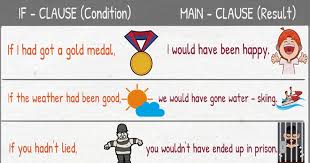Conditionals are sentences with two clauses – an ‘if clause and a main clause – that are closely related. Conditional sentences are often divided into different types.
Zero conditional
We use the zero conditional to talk about things that are always true.
- If you heat water, it boils.
- When the sun goes down, it gets dark.
- It lights up if you push that button.
The present simple is used in both clauses.
First conditional
We use the first conditional when we talk about real and possible situations.
- I’ll go shopping on the way home if I have time.
- If it’s a nice day tomorrow, we’ll go to the beach.
- If Arsenal win, they’ll be top of the league.
In first conditional sentences, the structure is usually if + present simple and will + infinitive. It’s not important which clause comes first.
Second conditional
The second conditional is used to talk about ‘unreal’ or impossible things.
- If I won a lot of money, I’d buy a big house in the country.
- Where would you live if you could live anywhere in the world?
- If you didn’t smoke so much, you’d feel a lot better.
The structure is usually if + past simple and would + infinitive. It’s not important which clause comes first.
Look at the difference between the first and second conditionals.
Look at the difference between the first and second conditionals.
- In January: If it snows tomorrow, I’ll go skiing. It might snow tomorrow.
- In August: If it snowed tomorrow, I’d go skiing. It almost certainly won’t snow tomorrow.
(From: https://learnenglish.britishcouncil.org/en/quick-grammar/conditionals-1)

(From: https://learnenglish.britishcouncil.org/en/quick-grammar/conditionals-2)
Third conditionals
Third conditional sentences describe the past. They describe something that didn’t happen.
- If I’d studied harder at school I would have gone to university.
He didn’t study very hard and he didn’t go to university.
- We wouldn’t have got lost if you hadn’t given me the wrong directions.
She wasn't given the correct directions and she didn't find her way.
- She might have finished the exam if she’d had more time.
She didn't finish the exam and she didn't have more time.
In third conditional sentences, the structure is usually if + past perfect and would + perfect infinitive (e.g. have done). It’s not important which clause comes first.
Notice that other modal verbs can be used instead of ‘would’ (e.g. ‘could’, ‘might’ ‘may’)
EXERCISES for you to practise:
First Conditional:
Second Conditional:
No comments:
Post a Comment